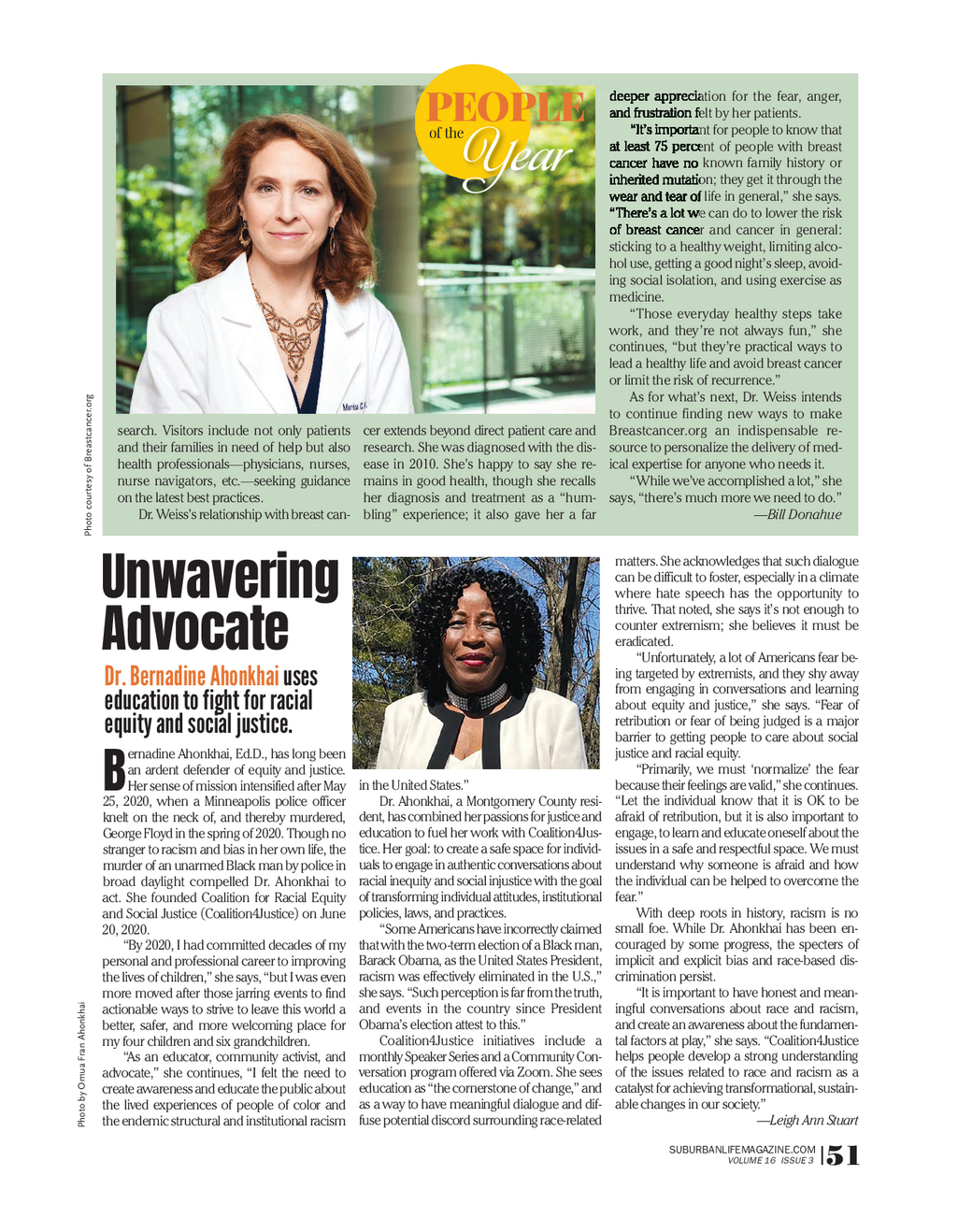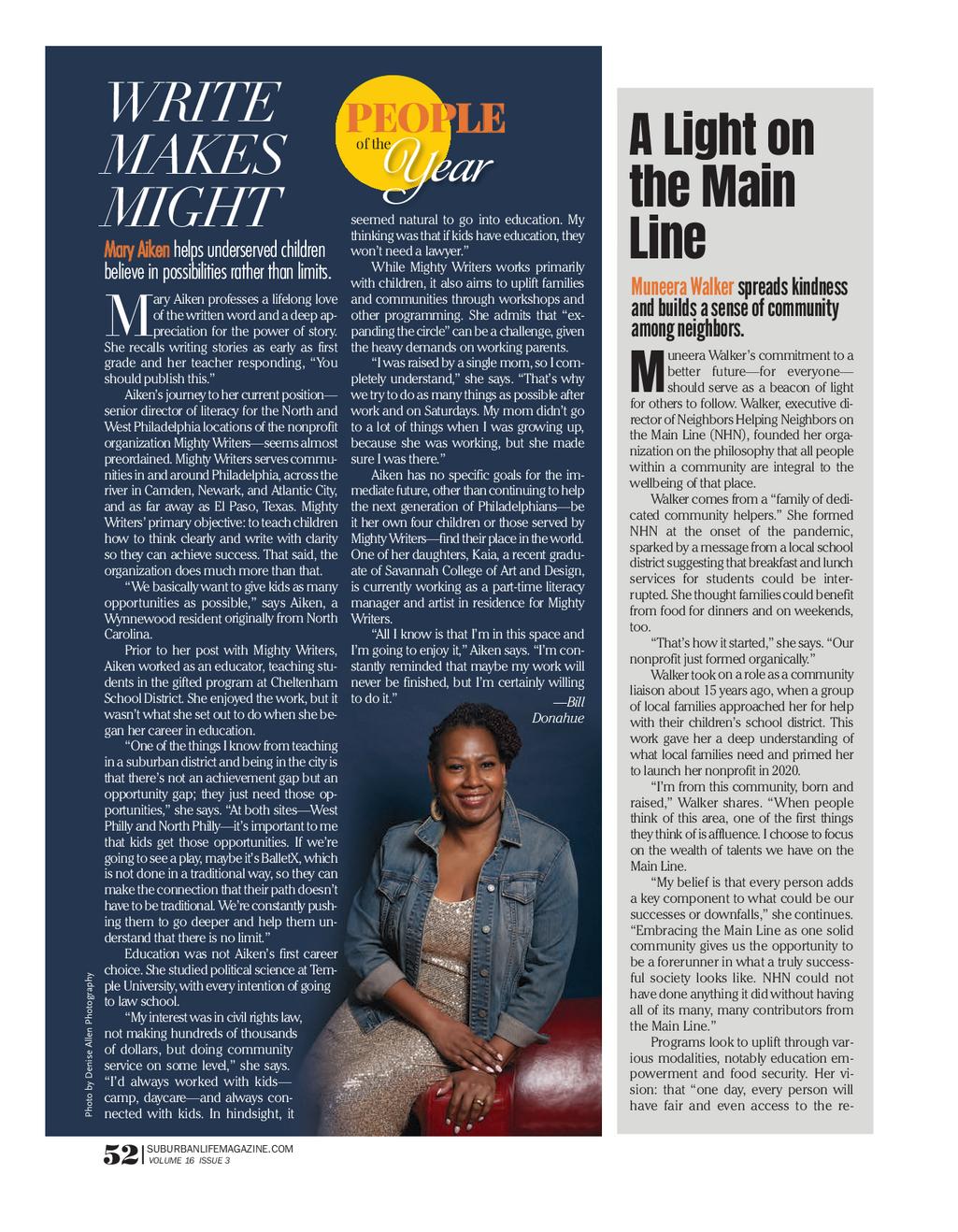SL_People of the Year_1224FINAL.qxp_Profile ( Dept . ) 1 / 7 / 25 2 : 38 PM Page 4 deeper appreciation for the fear , anger , and frustration felt by her patients . PEOPLE “ It’s important for people to know that of the at least 75 percent of people with breast cancer have no known family history or Year inherited mutation ; they get it through the wear and tear of life in general , ” she says . “ There’s a lot we can do to lower the risk of breast cancer and cancer in general : sticking to a healthy weight , limiting alco - hol use , getting a good night’s sleep , avoid - ing social isolation , and using exercise as medicine . “ Those everyday healthy steps take work , and they’re not always fun , ” she continues , “ but they’re practical ways to lead a healthy life and avoid breast cancer or limit the risk of recurrence . ” g As for what’s next , Dr . Weiss er.orintends to continue finding new ways to make anc cer extends beyond direct patient care and Breastcancer.org an indispensable re - search . Visitors include not only astcpatients research.She was diagnosed with the dis - source to personalize the delivery of med - and their families in need of help but Brealso f health professionals — physicians , nurses , ease in 2010 . She’s happy to say she re - ical expertise for anyone who needs it . o sy nurse navigators , etc . — seeking guidance mains in good health , though she recalls “ Whilewe’ve accomplished a lot , ” she urte on the latest best practices . her diagnosis and treatment as a “ hum - says , “ there’s much more we need to do . ” co o Dr.Weiss’s relationship with breast can - bling ” experience ; it also gave her a far — Bill PhotDonahue matters . She acknowledges that such dialogue can be difficult to foster , especially in a climate Unwavering where hate speech has the opportunity to thrive . That noted , she says it’s not enough to counter extremism ; she believes it must be eradicated . Advocate “ Unfortunately , a lot of Americans fear be - ing targeted by extremists , and they shy away Dr . Bernadine Ahonkhai uses from engaging in conversations and learning education to fight for racial about equity and justice , ” she says . “ Fear of being judged is a major retribution or fear of equity and social justice . barrier to getting people to care about social justice and racial equity . ernadineAhonkhai , Ed.D . , has long been “ Primarily , we must ‘ normalize ’ the fear an ardent defender of equity and justice . because their feelings are valid , ” she continues . inthe United States . ” BHer sense of mission intensified after May “ Let the individual know that it is OK to be Dr . Ahonkhai , a Montgomery County resi - 25 , 2020 , when a Minneapolis police officer afraid of retribution , but it is also important to dent , has combined her passions for justice and knelt on the neck of , and thereby murdered , engage , to learn and educate oneself about the education to fuel her work with Coalition4Jus - GeorgeFloyd in the spring of 2020 . Though no issues in a safe and respectful space . We must tice.Her goal : to create a safe space for individ - strangerto racism and bias in her own life , the understand why someone is afraid and how ualsto engage in authentic conversations about murderof an unarmed Black man by police in the individual can be helped to overcome the racialinequity and social injustice with the goal broad daylight compelled Dr . Ahonkhai to fear . ” of transforming individual attitudes , institutional act . She founded Coalition for Racial Equity With deep roots in history , racism is no policies , laws , and practices . and Social Justice ( Coalition4Justice ) on June small foe . While Dr . Ahonkhai has been en - “ SomeAmericans have incorrectly claimed 20,2020 . couraged by some progress , the specters of thatwith the two - term election of a Black man , “ By2020 , I had committed decades of my implicit and explicit bias and race - based dis - BarackObama , as the United States President , personaland professional career to improving crimination persist . racism was effectively eliminated in the U.S . , ” the lives of children , ” she says , “ but I was even “ Such perception is far from the truth , “ It is important to have honest and mean - shesays . moremoved after those jarring events to find ai and events in the country since President ingful conversations about race and racism , actionable ways to strive to leave this world nkha about the fundamen - Obama’selection attest to this . ” andcreate an oawareness better , safer , and more welcoming place for Ah tal factors at play , ” she says . “ Coalition4Justice Coalition4Justice initiatives include a myfour children and six grandchildren . Fran helps people develop a strong understanding monthlySpeaker Series and a Community Con - “ As an educator , community activist , and ua of the issues related to race and racism as a versationprogram offered via Zoom . She sees advocate , ” she continues , “ I felt the need to Om catalystfor achieving transformational , sustain - educationas “ the cornerstone of change , ” and createawareness and educate the public about by o ablechanges in our society . ” as a way to have meaningful dialogue and dif - the lived experiences of people of color and hot — Leigh Ann Stuart fuse potential discord surrounding race - related theendemic structural and institutional racism P SUBURBANLIFEMAGAZINE.COM VOLUME 16 ISSUE 3 | 51











































































































































































